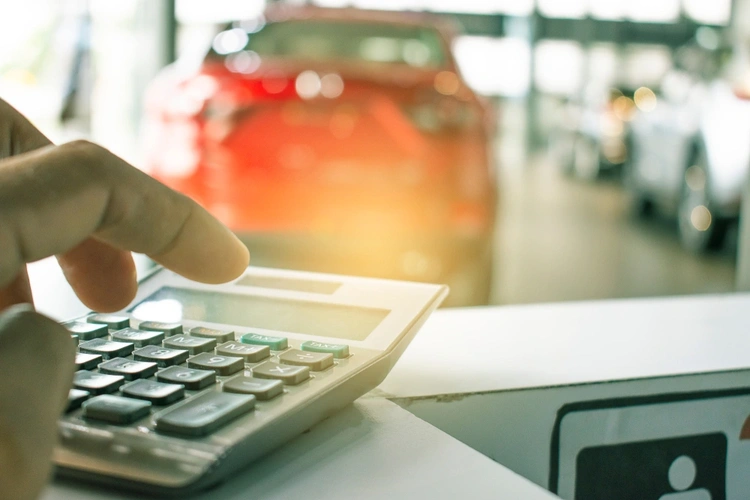How does a PCP loan work?
PCP loans are a type of car finance that allow you to split the cost of a new or used car into affordable monthly payments. Typically, you’ll need to put down an initial deposit and then make monthly repayments for a period of between two and five years. However, PCP car finance works differently from HP and personal loans as you don’t need to borrow an amount that covers the vehicle’s full purchase price. Instead, you’ll only borrow the amount the car will depreciate (lose value) during your loan term.
This means that your monthly payments can be lower than they would be with other types of car finance, but you won’t automatically take ownership of the car when the term ends. At the end of your PCP agreement, you can choose to return the car to the lender, use any positive equity as a deposit in a new deal, or become the car’s owner by paying the one-off balloon payment.
How does lease purchase work?
If you’ve ever come across the term ‘lease purchase’ but aren’t sure what it means, we’re here to help! Lease purchase is like PCP in that it helps you split the cost of your new car into fixed monthly repayments based on the vehicle’s depreciation, rather than its full purchase price. However, unlike PCP, lease purchase agreements don’t offer options at the end of the loan term. Instead, you must pay the lease purchase balloon payment and take ownership of the vehicle.
This is not to be confused with a car lease, where you essentially rent a car and hand it back at the end of your agreement with no further payments to be made.
How is a balloon payment calculated?
Balloon payments are usually calculated at the start of your agreement.
The lender bases its calculations on the car’s GMFV, which is the amount it believes your vehicle will be worth at the end of your loan term.
Depreciation isn’t an exact science, and many things can influence how much your car is worth over time, but lenders will make an educated guess based on the car’s make and model, your expected annual mileage, and the length of the agreement.
No matter what happens during your loan – within reason – the balloon payment will be fixed and won’t change, even if your car’s true value is more or less than this amount when the loan term ends.
What are the pros and cons of balloon payments?
In recent years, balloon payments have been a hot topic of debate, but like any finance option, there are several pros and cons to consider:
Balloon payment pros
- Balloon payments can help you secure a lower monthly repayment amount – as they aren’t payable until the end
- You can choose not to pay the balloon payment and simply hand the car back to the lender
- If your balloon payment is lower than the car’s actual value, you may have positive equity available to use as a deposit for a new car
Balloon payment cons
- Balloon payments can be large, sometimes hundreds or even thousands of pounds, which may limit your ability to take ownership of the car
- The cost of your car may be more expensive in the long run if you need to refinance the balloon payment with a new loan
- Balloon payments are included in the 50% voluntary termination threshold, meaning you may need to pay more or wait longer to become eligible
Can I refinance a balloon payment on a car?
Depending on the car you’ve chosen to buy, its balloon payment can be quite large, ranging from a few hundred to several thousand pounds. If you don’t have savings available or can’t afford to pay this amount in one lump sum, you don’t always have to hand the car back to the lender. Instead, you can choose to refinance the PCP balloon payment by taking out a new loan to cover it.
There are lenders that can offer refinancing loans to people with a wide range of circumstances and credit scores. However, it may be worth keeping in mind that you’ll probably need to pay interest on your loan, which could make it more expensive in the long run.
Do you have to pay the balloon payment?
One of the best things about a PCP car deal is that you have options. When you reach the end of your agreement, you can choose to pay the balloon payment and buy the car, use any positive equity as a deposit for a new car, or hand the vehicle back.
If you would rather not pay the balloon payment and car ownership isn’t important to you, you can simply give the car back to the lender and walk away (although extra charges may apply if you’ve exceeded the mileage restrictions or damaged the car).
There are also other types of car finance available that don’t include balloon payments, including:
Hire Purchase Car Finance
Hire purchase (HP) loans are one of the most popular types of car finance. Typically, you’ll be asked to put down a deposit upfront, followed by fixed monthly payments for a period of up to five years. At the end of the loan term, once all your repayments have been made, you’ll pay a small ‘Option to Purchase’ admin fee and then take ownership of the car.
Personal Loan
Personal loans work differently from both HP and PCP loans, as they shouldn’t be secured to the vehicle. This means that you’ll take ownership of the car as soon as you’ve used the loan to pay the seller. However, as the loan is unsecured, it does pose more risk to the lender and so you may need a strong credit score to be eligible.
How do balloon payments affect voluntary termination?
Under Section 99 of the Consumer Credit Act 1974, you have the right to voluntarily terminate your PCP car finance agreement when you have paid 50% or more of the total amount payable. Balloon payments can affect voluntary termination as they are included in the total amount payable. This can make the 50% threshold a lot higher than you may think and you’ll need to be a lot further into your loan term to meet it than you would need to be with an HP loan.
However, you don’t necessarily need to wait until you’ve reached the 50% threshold and can instead choose to pay the difference to become eligible.
Get Car Finance up to £100,000
- Check your eligibility without impacting your credit score
- No deposit needed
- Rates from 8.9%* APR
'Representative Example: Borrow £12,000 over 5 years with a £0 deposit. Representative 20.5% APR fixed rate. Monthly payment: £309.93. Option to purchase fee £10 payable. Total cost of credit: £6,605.80. Total amount repayable: £18,605.80.
We are a credit broker, not a lender. We partner with CarFinance 247 Limited, a credit broker (not a lender) who works with a wide panel of lenders.
Disclaimer: We make every effort to ensure content is correct when published. Information on this website doesn't constitute financial advice, and we aren't responsible for the content of any external sites.





